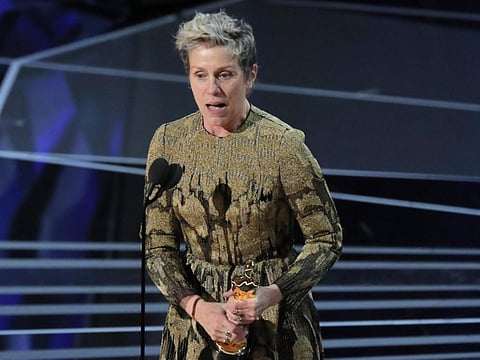Warner Bros is first studio to adopt inclusion policy
The new policy, building on the ‘inclusion rider’ concept, will begin with the Michael B Jordan film ‘Just Mercy’

Warner Bros has become the first major Hollywood studio to adopt a company-wide policy meant to increase diversity on and off screen, expanding the “inclusion rider” concept popularised by actor Frances McDormand earlier this year.
The initiative announced on Wednesday, which will also apply to sister companies HBO and Turner, will begin with Just Mercy, a film starring Michael B Jordan, who was one of the first actors to commit to the idea in March. Inclusion riders are provisions that actors and others in the industry can add to their contracts to stipulate diversity in the casts and crews of their projects.
The pledge is a notable step in the ongoing push to diversify the entertainment industry, which has long been dominated by white men, a problem exposed by the #OscarsSoWhite campaign and the recent #MeToo and Time’s Up movements. McDormand introduced the phrase at the end of her best actress speech, giving mainstream attention to an idea legal experts and academics have discussed for years.
“Inclusivity has always been a no-brainer for me, especially as a black man in this business,” the Black Panther star said in a statement. “It wasn’t until Frances McDormand spoke the two words that set the industry on fire — inclusion rider — that I realised we could standardise this practice.”
A handful of high-profile actors and directors, including Brie Larson, Matt Damon, Ben Affleck and Paul Feig, have expressed varying commitments to using inclusion riders. But advocates have repeatedly argued that powerful studios could have a much greater impact by adopting company-wide policies.
WarnerMedia, the parent company of HBO and Warner Bros, did not provide details of its policy in the announcement, saying in a statement that in the “early stages of the production process, we will engage with our writers, producers and directors to create a plan for implementing this commitment to diversity and inclusion on our projects, with the goal of providing opportunities for individuals from under-represented groups at all levels”.
Stacy L Smith, founder of the Annenberg Inclusion Initiative at the University of Southern California, first outlined inclusion riders in a 2016 speech and has argued that an effective way to improve representation for women, people of colour, LGBT people and other marginalised groups is to make proactive commitments in contracts.
Smith’s research has shone a harsh light on the persistent exclusion in the industry, with her latest study released this summer finding that there has been “no progress” in on-screen representation in the past decade. Her analysis of the top 100 films each year since 2007 found that only 31.8 per cent of characters with dialogue were women in 2017, which is roughly the same rate that has been in place for a decade.
Last year, white actors were cast in 70.7 per cent of all speaking roles, and men occupied more than twice as many roles as women, the research found.
Jordan, who begins production this week on Just Mercy, called the WarnerMedia policy an “enormous step forward”, adding, “This is a legacy-bearing moment.”
WarnerMedia said it would issue an annual report on its progress.


